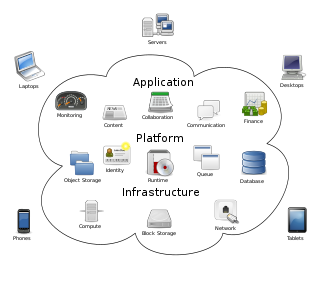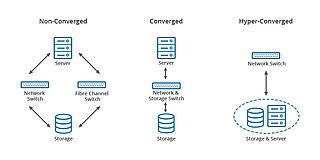Related Research Articles
Information technology management is the discipline whereby all of the information technology resources of a firm are managed in accordance with its needs and priorities. Managing the responsibility within a company entails many of the basic management functions, like budgeting, staffing, change management, and organizing and controlling, along with other aspects that are unique to technology, like software design, network planning, tech support etc.
Enterprise content management (ECM) extends the concept of content management by adding a timeline for each content item and, possibly, enforcing processes for its creation, approval, and distribution. Systems using ECM generally provide a secure repository for managed items, analog or digital. They also include one methods for importing content to manage new items, and several presentation methods to make items available for use. Although ECM content may be protected by digital rights management (DRM), it is not required. ECM is distinguished from general content management by its cognizance of the processes and procedures of the enterprise for which it is created.

ProLiant is a brand of server computers that was originally developed and marketed by Compaq, Hewlett-Packard (HP), and currently marketed by Hewlett Packard Enterprise (HPE). ProLiant servers were first introduced by Compaq in 1993, succeeding their SystemPro line of servers in the high-end space.

"Cloud computing is a paradigm for enabling network access to a scalable and elastic pool of shareable physical or virtual resources with self-service provisioning and administration on-demand," according to ISO.
Dynamic Infrastructure is an information technology concept related to the design of data centers, whereby the underlying hardware and software can respond dynamically and more efficiently to changing levels of demand. In other words, data center assets such as storage and processing power can be provisioned to meet surges in user's needs. The concept has also been referred to as Infrastructure 2.0 and Next Generation Data Center.

Information technology infrastructure is defined broadly as a set of information technology (IT) components that are the foundation of an IT service; typically physical components, but also various software and network components.
HP IT Management Software is a family of Enterprise software products by OpenText as a result of the spin-merge of Hewlett Packard Enterprise's software assets with Micro Focus in 2017 and acquisition of Micro Focus by OpenText in 2023. The division was formerly owned by Hewlett Packard Enterprise, following the separation of Hewlett-Packard into HP Inc. and Hewlett Packard Enterprise in 2015. IT management software is a family of technology that helps companies manage their IT infrastructures, the people and the processes required to reap the greatest amount of responsiveness and effectiveness from today's multi-layered and highly complex data centers. Beginning in September 2005, HP purchased several software companies as part of a publicized, deliberate strategy to augment its catalog of IT management software offerings for large business customers. According to ZDNet and IDC, HP is the world's sixth largest software company.

Converged infrastructure is a way of structuring an information technology (IT) system which groups multiple components into a single optimized computing package. Components of a converged infrastructure may include servers, data storage devices, networking equipment and software for IT infrastructure management, automation and orchestration.
HP Cloud Service Automation is cloud management software from Hewlett Packard Enterprise (HPE) that is used by companies and government agencies to automate the management of cloud-based IT-as-a-service, from order, to provision, and retirement. HP Cloud Service Automation orchestrates the provisioning and deployment of complex IT services such as of databases, middleware, and packaged applications. The software speeds deployment of application-based services across hybrid cloud delivery platforms and traditional IT environments.
HP Business Service Automation was a collection of software products for data center automation from the HP Software Division of Hewlett-Packard Company. The products could help Information Technology departments create a common, enterprise-wide view of each business service; enable the automation of change and compliance across all devices that make up a business service; connect IT processes and coordinate teams via common workflows; and integrate with monitoring and ticketing tools to form a complete, integrated business service management solution. HP now provides many of these capabilities as part of HP Business Service Management software and solutions.
Hewlett Packard Enterprise Networking is the Networking Products division of Hewlett Packard Enterprise ("HP"). HPE Networking and its predecessor entities have developed and sold networking products since 1979. Currently, it offers networking and switching products for small and medium sized businesses through its wholly owned subsidiary Aruba Networks. Prior to 2015, the entity within HP which offered networking products was called HP Networking.

Converged storage is a storage architecture that combines storage and computing resources into a single entity. This can result in the development of platforms for server centric, storage centric or hybrid workloads where applications and data come together to improve application performance and delivery. The combination of storage and compute differs to the traditional IT model in which computation and storage take place in separate or siloed computer equipment. The traditional model requires discrete provisioning changes, such as upgrades and planned migrations, in the face of server load changes, which are increasingly dynamic with virtualization, where converged storage increases the supply of resources along with new VM demands in parallel.
HP ConvergedSystem is a portfolio of system-based products from Hewlett-Packard (HP) that integrates preconfigured IT components into systems for virtualization, cloud computing, big data, collaboration, converged management, and client virtualization. Composed of servers, storage, networking, and integrated software and services, the systems are designed to address the cost and complexity of data center operations and maintenance by pulling the IT components together into a single resource pool so they are easier to manage and faster to deploy. Where previously it would take three to six months from the time of order to get a system up and running, it now reportedly takes as few as 20 days with the HP ConvergedSystem.
HP CloudSystem is a cloud infrastructure from Hewlett Packard Enterprise (HPE) that combines storage, servers, networking and software.

HP Cloud was a set of cloud computing services available from Hewlett-Packard. It was the combination of the previous HP Converged Cloud business unit and HP Cloud Services, an OpenStack-based public cloud. It was marketed to enterprise organizations to combine public cloud services with internal IT resources to create hybrid clouds, or a mix of private and public cloud environments, from around 2011 to 2016.
Cloud management is the management of cloud computing products and services.

The Hewlett Packard Enterprise Company (HPE) is an American multinational information technology company based in Spring, Texas.

SAP Converged Cloud is a private managed cloud developed and marketed by SAP.
Data center management is the collection of tasks performed by those responsible for managing ongoing operation of a data center. This includes Business service management and planning for the future.
References
- ↑ Computerworld: "HP announces converged storage strategy, products," Lucas Mearian, June 6, 2011.
- ↑ CRN: "HP Reaching Out to Enterprise CIOs with New Services," Kevin McLaughlin, April 25, 2011.
- ↑ HP news release: "HP Technology Consulting Services Help Clients Align IT Strategy with Business Goals." April 25, 2011.